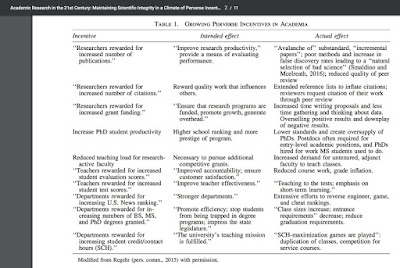According to Wikipedia, "A perverse incentive is an incentive that has an unintended and undesirable result which is contrary to the interests of the incentive makers. Perverse incentives are a type of negative unintended consequence."
There is an excellent (but depressing) article
Academic Research in the 21st Century: Maintaining Scientific Integrity in a Climate of Perverse Incentives and Hypercompetition
Edwards Marc A. and Roy Siddhartha
I learnt of the article via a blog post summarising it, Every attempt to manage academia makes it worse.
Incidentally, Edwards is a water quality expert who was influential in exposing the Flint Water crisis.
The article is particularly helpful because it cites a lot of literature concerning the problems. It contains the following provocative table. I also like the emphasis on ethical behaviour and altruism.
It is easy to feel helpless. However, the least action you can take is to stop looking at metrics when reviewing grants, job applicants, and tenure cases. Actually read some of the papers and evaluate the quality of the science. If you don't have the expertise then you should not be making the decision or should seek expert review.
Subscribe to:
Post Comments (Atom)
Information theoretic measures for emergence and causality
The relationship between emergence and causation is contentious, with a long history. Most discussions are qualitative. Presented with a new...

-
This week Nobel Prizes will be announced. I have not done predictions since 2020 . This is a fun exercise. It is also good to reflect on w...
-
Is it something to do with breakdown of the Born-Oppenheimer approximation? In molecular spectroscopy you occasionally hear this term thro...
-
Nitrogen fluoride (NF) seems like a very simple molecule and you would think it would very well understood, particularly as it is small enou...




"Actually read some of the papers and evaluate the quality of the science". These following papers one should keep at the working desk, so that any time one thinks of metrics just look at your desk with these papers. All will be calm.
ReplyDeleteRosalind Franklin papers : The Holes in coal.
https://profiles.nlm.nih.gov/ps/retrieve/Narrative/KR/p-nid/186/p-docs/true
When an industry is heavily subsidized, people are ready to admit that that may well distort its actual value. When this applies to academia, however, they tend to defend with excuses meaning nothing but double standard ... In my opinion, academia has been too much subsidized. Yet scientists are still asking for more subsidies. Insane.
ReplyDeleteThe biggest problem is exactly thinking that academia is an industry. By definition, industry (business activity) aims to make money. When the purpose of academia/university/school is to make money, the customer (i.e., students) should be treated as "king", i.e., the customer is always right. However, this goes against the nature of learning and education.
ReplyDeleteIt seems to me, the root of the problem mentioned in this post is: Many decision makers in academia are not domain experts and they don't bother asking experts. The easiest and fastest way for non experts to make decision is, sadly, by bin counting. Hence, the various superficial metrics that have been invented.
I agree.
DeletePhysicists and Mathematicians who have the arXiv publications are the right intellectuals to resort to activism to abolish metrics. One can easily observe that phy/maths academia do not rely on quantity of publications compared to other areas of science. For example chemistry does not have arXiv like the one phy/maths has. A request to phys/maths academia is to start a petition online and get all the Nobel Laureates and very reputed contributors to science support this petion to abolish metrics. An Emeritus Maths/Phy academic can get to this activism. Metrics has caused havoc. Many countries they have used for recruitment , promotion , grants etc. By tweaking metrics incapable people have become Professors.
ReplyDeleteHope this request will be taken seriously to make science great again.
Just out of curiosity . There are physicists who have won Nobel Prize in Chemistry. Rutherford , Ramakrishnan ( for ribosome), there must be some more.
ReplyDeleteAny idea if any chemist's have won Nobel Prize in Physics?
A chemist has never won the Physics Nobel. This is discussed further at
Deletehttp://condensedconcepts.blogspot.com.au/2012/02/will-chemist-ever-win-nobel-prize-in.html
Not dictated by metrics , this retiree reminds one of the genius from the Swiss patent office in 1904. Will technology produce 1904 again as it is in the case of 2017 wrt this retiree.
ReplyDeleteA Retiree Discovers an Elusive Math Proof—And Nobody Notices
https://www.wired.com/2017/04/elusive-math-proof-found-almost-lost/?utm_content=buffer5e4c9&utm_medium=social&utm_source=twitter.com&utm_campaign=buffer